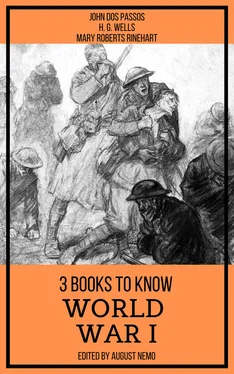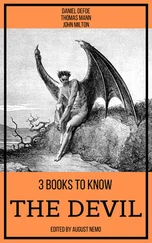He dreamed he was home in Indiana, but instead of his mother cooking at the stove in the kitchen, there was the Frenchwoman who had stood in the farmhouse door, and near her stood a lieutenant with a little red book in his hand. He was eating cornbread and syrup off a broken plate. It was fine cornbread with a great deal of crust on it, crisp and hot, on which the butter was cold and sweet to his tongue. Suddenly he stopped eating and started swearing, shouting at the top of his lungs: “You goddam...” he started, but he couldn't seem to think of anything more to say. “You goddam...” he started again. The lieutenant looked towards him, wrinkling his black eyebrows that met across his nose. He was Sergeant Anderson. Chris drew his knife and ran at him, but it was Andy his bunkie he had run his knife into. He threw his arms round Andy's body, crying hot tears.... He woke up. Mess kits were clinking all about the dark crowded loft. The men had already started piling down the stairs.
The larks filled the wine-tinged air with a constant chiming of little bells. Chrisfield and Andrews were strolling across a field of white clover that covered the brow of a hill. Below in the valley they could see a cluster of red roofs of farms and the white ribbon of the road where long trains of motor trucks crawled like beetles. The sun had just set behind the blue hills the other side of the shallow valley. The air was full of the smell of clover and of hawthorn from the hedgerows. They took deep breaths as they crossed the field.
“It's great to get away from that crowd,” Andrews was saying.
Chrisfield walked on silently, dragging his feet through the matted clover. A leaden dullness weighed like some sort of warm choking coverlet on his limbs, so that it seemed an effort to walk, an effort to speak. Yet under it his muscles were taut and trembling as he had known them to be before when he was about to get into a fight or to make love to a girl.
“Why the hell don't they let us git into it?” he said suddenly.
“Yes, anything'ld be better than this... wait, wait, wait.”
They walked on, hearing the constant chirrup of the larks, the brush of their feet through the clover, the faint jingle of some coins in Chrisfield's pocket, and in the distance the irregular snoring of an aeroplane motor. As they walked Andrews leaned over from time to time and picked a couple of the white clover flowers.
The aeroplane came suddenly nearer and swooped in a wide curve above the field, drowning every sound in the roar of its exhaust. They made out the figures of the pilot and the observer before the plane rose again and vanished against the ragged purple clouds of the sky. The observer had waved a hand at them as he passed. They stood still in the darkening field, staring up at the sky, where a few larks still hung chirruping.
“Ah'd lahk to be one o' them guys,” said Chrisfield.
“You would?”
“God damn it, Ah'd do anything to git out o' this hellish infantry. This ain't no sort o' life for a man to be treated lahk he was a nigger.”
“No, it's no sort of life for a man.”
“If they'd let us git to the front an' do some fightin' an' be done with it.... But all we do is drill and have grenade practice an' drill again and then have bayonet practice an' drill again. 'Nough to drive a feller crazy.”
“What the hell's the use of talking about it, Chris? We can't be any lower than we are, can we?” Andrews laughed.
“There's that plane again.”
“Where?”
“There, just goin' down behind the piece o' woods.”
“That's where their field is.”
“Ah bet them guys has a good time. Ah put in an application back in trainin' camp for Aviation. Ain't never heard nothing from it though. If Ah had, Ah wouldn't be lower than dirt in this hawg-pen.”
“It's wonderful up here on the hill this evening,” said Andrews, looking dreamily at the pale orange band of light where the sun had set. “Let's go down and get a bottle of wine.”
“Now yo're talkin'. Ah wonder if that girl's down there tonight.”
“Antoinette?”
“Um-hum.... Boy, Ah'd lahk to have her all by ma-self some night.”
Their steps grew brisker as they strode along a grass-grown road that led through high hedgerows to a village under the brow of the hill. It was almost dark under the shadow of the bushes on either side. Overhead the purple clouds were washed over by a pale yellow light that gradually faded to grey. Birds chirped and rustled among the young leaves.
Andrews put his hand on Chrisfield's shoulder.
“Let's walk slow,” he said, “we don't want to get out of here too soon.” He grabbed carelessly at little cluster of hawthorn flowers as he passed them, and seemed reluctant to untangle the thorny branches that caught in his coat and on his loosely wound puttees.
“Hell, man,” said Chrisfield, “we won't have time to get a bellyful. It must be gettin' late already.”
They hastened their steps again and came in a moment to the first tightly shuttered houses of the village.
In the middle of the road was an M.P., who stood with his legs wide apart, waving his “billy” languidly. He had a red face, his eyes were fixed on the shuttered upper window of a house, through the chinks of which came a few streaks of yellow light. His lips were puckered up as if to whistle, but no sound came. He swayed back and forth indecisively. An officer came suddenly out of the little green door of the house in front of the M.P., who brought his heels together with a jump and saluted, holding his hand a long while to his cap. The officer flicked a hand up hastily to his hat, snatching his cigar out of his mouth for an instant. As the officer's steps grew fainter down the road, the M.P. gradually returned to his former position.
Chrisfield and Andrews had slipped by on the other side, and gone in at the door of a small ramshackle house of which the windows were closed by heavy wooden shutters.
“I bet there ain't many of them bastards at the front,” said Chris.
“Not many of either kind of bastards,” said Andrews laughing, as he closed the door behind them. They were in a room that had once been the parlor of a farmhouse. The chandelier with its bits of crystal and the orange-blossoms on a piece of dusty red velvet under a bell glass on the mantelpiece denoted that. The furniture had been taken out, and four square oak tables crowded in. At one of the tables sat three Americans and at another a very young olive-skinned French soldier, who sat hunched over his table looking moodily down into his glass of wine.
A girl in a faded frock of some purplish material that showed the strong curves of her shoulders and breasts slouched into the room, her hands in the pocket of a dark blue apron against which her rounded forearms showed golden brown. Her face had the same golden tan under a mass of dark blonde hair. She smiled when she saw the two soldiers, drawing her thin lips away from her ugly yellow teeth.
“Ca va bien, Antoinette?” asked Andrews.
“Oui,” she said, looking beyond their heads at the French soldier who sat at the other side of the little room.
“A bottle of vin rouge, vite,” said Chrisfield.
“Ye needn't be so damn vite about it tonight, Chris,” said one of the men at the other table.
“Why?”
“Ain't a-goin' to be no roll call. Corporal tole me his-self. Sarge's gone out to git stewed, an' the Loot's away.”
“Sure,” said another man, “we kin stay out as late's we goddam please tonight.”
“There's a new M.P. in town,” said Chrisfield.... “Ah saw him maself.... You did, too, didn't you, Andy?”
Andrews nodded. He was looking at the Frenchman, who sat with his face in shadow and his black lashes covering his eyes. A purplish flash had suffused the olive skin at his cheekbones.
Читать дальше












